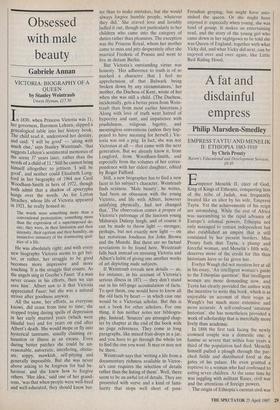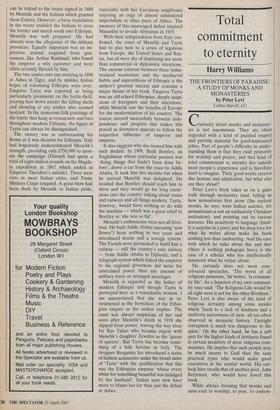A fat and disdainful empress
Philip Marsden-Smedley
EMPRESS TAYTU AND MENELIK II: ETHIOPIA 1883-1910 by Chris Prouty
Raven's Educational and Development Services, £9.95
Emperor Menelik II, elect of God, King of Kings of Ethiopia, conquering lion of the tribe of Judah, was frequently treated like an idiot by his wife, Empress Taytu. Yet the achievements of his reign are astonishing. While the rest of Africa was succumbing to the rapid advance of Europe's colonial powers, Ethiopia not only managed to remain independent but also established an empire that is still contained by her present borders. Miss Prouty feels that Taytu, a plump and forceful woman, and Menelik's fifth wife, deserves more of the credit for this than historians have so far given her.
Evelyn Waugh did not mention her at all in his essay, 'An intelligent woman's guide to the Ethiopian question'. But intelligent women are more demanding now, and Taytu has clearly provided the author with the incentive to write this book, which is as enjoyable an account of their reign as Waugh's but much more extensive and more accurate. A self-confessed 'amateur historian', she has nonetheless provided a work of scholarship that is mercifully more lively than academic.
In 1888 the first task facing the newly crowned couple was a domestic one: a famine so severe that within four years a third of the population had died. Menelik himself pulled a plough through the par- ched fields and distributed food at the gates of his palace. He even granted a reprieve to a woman who had confessed to eating seven children. At the same time he was juggling with militant Rases, civil war and the attentions of foreign powers.
The origin of Ethiopia's current civil war can be traced to the treaty signed in 1889 by Menelik and the Italians which granted them Eritrea. However, a loose translation in the treaty enabled the Italians to cross the border and march south into Ethiopia. Menelik was well prepared. He had already won the allegiance of the militant provinces. Equally important was an im- pressive arsenal acquired from gun- runners, like Arthur Rimbaud, who found the emperor a wily customer and were often severely fleeced by him.
The two armies met one morning in 1896 at Adwa in Tigre, and by midday Italian hopes of colonising Ethiopia were over. Empress Taytu was reported as being particularly prominent on the battle-field, praying face down amidst the falling shells and shouting at any soldier who seemed hesitant. In the numerous folk paintings of the battle that hang in restaurants and bars throughout modern Ethiopia, the figure of Taytu can always be distinguished.
The victory was as embarrassing for Rome as it was decisive for Ethiopia. Italy had hopelessly underestimated Menelik's strength, providing only £750,000 to spon- sor the campaign (Disraeli had spent a total of eight million pounds on the Magda- la expedition in 1867 which ended in Emperor Theodore's suicide). There were riots in most Italian cities, and Prime Minister Crispi resigned. A great blow had been dealt by Menelik to Italian pride, especially with her European neighbours enjoying an orgy of almost unhindered imperialism in other parts of Africa. The memory of this unavenged defeat inspired Mussolini to invade Abyssinia in 1935.
With their independence from Italy con- firmed, the court of Menelik and Taytu had to play host to a series of legations from Europe, the United States and Rus- sia, but all were shy of displaying any more than commercial or diplomatic intentions. The curious contrast between these indus- trialised westerners and the mediaeval habits and superstitions of Ethiopia is the author's greatest success and contains a major theme of her book. Empress Taytu was an old-school Ethiopian, deeply suspi- cious of foreigners and their intentions, while Menelik saw the benefits of Europe for the modernisation of his country. The course steered successfully between inde- pendence and progress that makes this period so formative appears to follow the respective influence of emperor and empress.
It also suggests why she treated him with such disdain. In 1909, Bede Bentley, an Englishman whose particular passion was `doing things that hadn't been done be- fore', drove a car from the coast to Addis Ababa. It took him five months but when he arrived Menelik was delighted. He insisted that Bentley should teach him to drive and they would go for long excur- sions into the country talking about trains and railways and all things modern. Taytu, however, would have nothing to do with the machine — which was a great relief to Bentley as 'she was so fat'.
Menelik's enthusiasms were not all frivo- lous. He built Addis Ababa (meaning 'new flower') from nothing in two years and introduced drains and a sewage system. The French were persuaded-to build him a railway — still the country's only railway — from Addis Ababa to Djibouti; and a telegraph system which linked the emperor to his regional governors did more for centralised power than any amount of military force or arranged marriages.
Menelik is regarded as the father of modern Ethiopia and though Taytu is portrayed here as a remarkable woman, I am unconvinced that she was as in- strumental in the formation of the Ethio- pian empire as the author implies. The court was always suspicious of her and soon after Menelik's death in 1918 she slipped from power, leaving the way clear for Ras Tafari who became regent with Menelik's daughter Zewditu as the 'queen of queens'. But Taytu has become some- thing of a folk heroine in Italy. The designer Bergamin has introduced a series of fashion accessories under the brand name of `Taitu' with the qualification that this was the Ethiopian empress 'whose every whim for something beautiful was indulged by her husband'. Italian men now have more to blame her for than just the defeat at Adwa.



































































 Previous page
Previous page